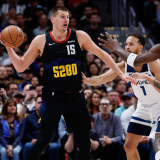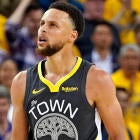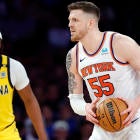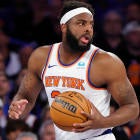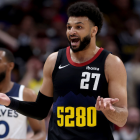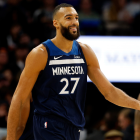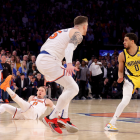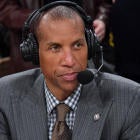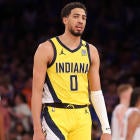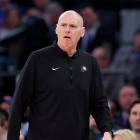OAKLAND – The 2014-15 NBA season was the year that the defining dynasty of this era began its reign. But going into that season, that year's storyline was supposed to be something very different.
The storyline going into the season was this: LeBron James, after his Miami Heat had been dispatched by the San Antonio Spurs and a 22-year-old phenom named Kawhi Leonard in the 2014 NBA Finals, had decided to take his talents back to his hometown. He quickly formed his newest superteam alongside Kyrie Irving and Kevin Love on the Cleveland Cavaliers. Sure, the Warriors were an up-and-coming team with a thrilling young trio in Stephen Curry, Klay Thompson and Draymond Green and a new head coach in Steve Kerr, but they weren't supposed to ascend to become the class of the NBA as quickly as they would. As a six-seed, they'd put in an impressive seven-game series in the first round of the playoffs against Chris Paul, Blake Griffin and the Los Angeles Clippers, but the 2014-15 season was supposed to be about LeBron and Cleveland, or perhaps a repeat from the San Antonio Spurs, or something special from Kevin Durant and Russell Westbrook and the Oklahoma City Thunder, or Paul and Griffin finally succeeding in the playoffs. It wasn't predicted to be the season where an oddball group of misfits changed the NBA – and basketball – forever.
Five years later, the 2018-19 season was going to be a season of inevitability in the Warriors' march to becoming perhaps the greatest NBA dynasty of all time. After signing Kevin Durant in free agency, the Warriors had mostly coasted to two titles. Their talent was so superior to any other team in the NBA that it felt like a three-peat was a foregone conclusion. Part of the reason fans have been so focused on 2019 free agency was because that was seen as the next moment that the Warriors' primacy could be challenged, not on the court but instead off the court, where this juggernaut could finally be broken up.
On the morning of the first day of the 2018-19 season, I interviewed Kerr at the Warriors' practice facility, and I asked him about the difficulty of dealing with that sense of inevitability.
"What we're trying to do is remind our guys how lucky we are to be in this position," Kerr told me. "We want to enjoy it for as long as it lasts. Maybe it lasts a few more seasons. Who knows? Maybe it doesn't. You don't know what's coming in the NBA, or in life."
Certainly the Warriors could never have envisioned it would end like this: In one final, bittersweet game at Oracle Arena, against a perpetually underachieving Toronto Raptors franchise, in a series where the banged-up, shallow Warriors were thoroughly dominated from start to finish, and with the lingering emotions of Durant's devastating Achilles injury in Game 5 casting a dark shadow on it all.
On Thursday night, there was a nice piece of symmetry to what sure feels like the end of this dynasty: Kawhi Leonard, the same player who put a nail in the coffin of LeBron's stint in Miami five years ago, did the exact same to the Golden State Warriors.
Where do the Warriors go from here? Who knows? Nobody knows how the injury will change Durant's approach to free agency. Maybe he'll opt in for his final season, rehab as a Warrior, and see what happens. Maybe this team sticks together for the long haul. Or maybe Durant moves on and the Warriors reconstruct themselves around their original core. After all, Curry is only 31, while Klay Thompson and Draymond Green are both 29 – very much still in their primes.
But the story of what comes next was not as important after Thursday's elimination as the story of what has transpired in the past five years. This Warriors' dynasty has been the most important NBA dynasty since Michael Jordan's Chicago Bulls. They have not just won three titles but changed the sport of basketball. The 3-point revolution, the switchy, versatile, positionless way this game has evolved: The Warriors may not have invented it but they perfected it and accelerated its progress into the mainstream.
In an odd way, there's some symmetry with those Jordan Bulls. The Warriors head coach, of course, teamed with Jordan for two of his six titles. Like the Bulls before them, much of the focus on the Warriors' greatness has been on their vaunted offense, but it was really the dynamic defense that formed the backbone of both teams. And while Phil Jackson's triangle offense is clearly different than the movement-heavy offense of these Warriors, the two philosophies look at basketball in a similar way, valuing versatility and unpredictability, ball movement and player movement.
We don't know whether this dynasty is over. Maybe Durant stays. Maybe the Warriors can recapture their old identity and keep winning titles. But Thursday night, with the emotion of Durant's injury a few nights before coupled with the emotion of Thompson's knee injury, had a feeling of finality to it. They went out like champions, like true warriors, like, to borrow Steve Kerr's phrase, "f-cking giants." But this time they did not have enough.
And if this is it for the Warriors, they will have fallen short of the ultimate goal – to become the greatest dynasty in modern NBA history – but they still will have defined an epoch of the NBA, and changed the game forever.









